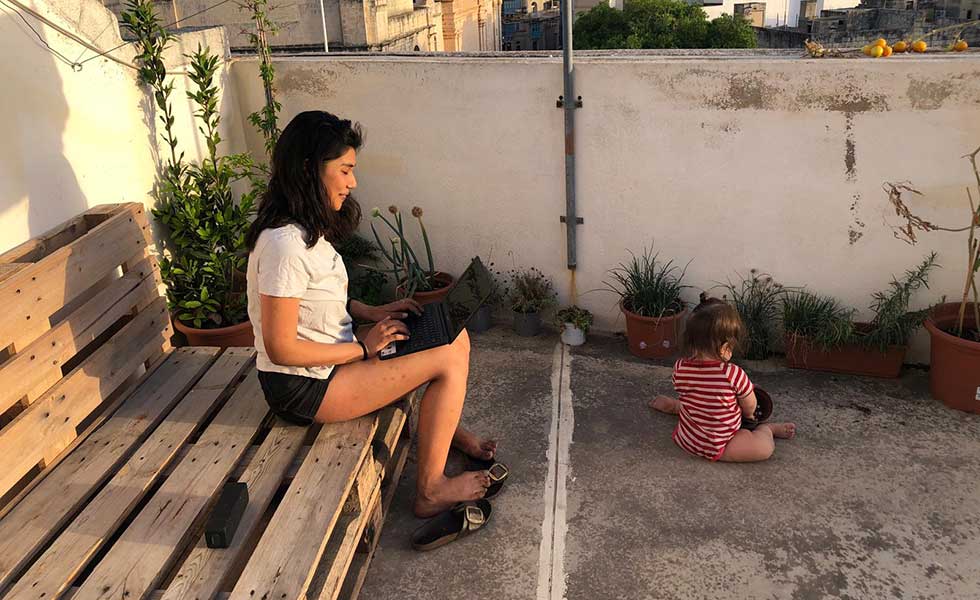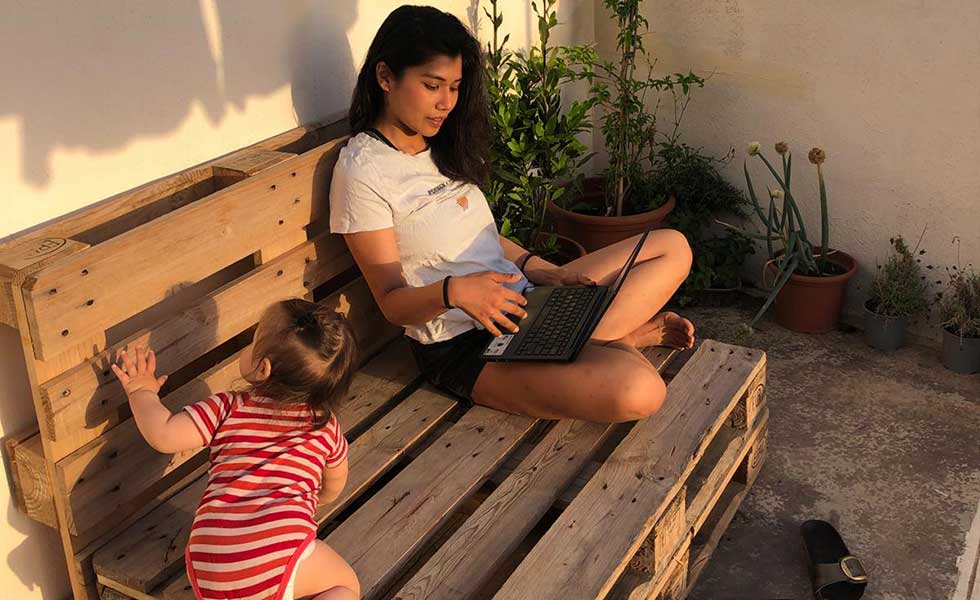Freelance Life Magazine always tries to present you interesting freelancers and their stories, this time we have the pleasure to present Momoko, translator and content writer on the UpWork platform.
Science and art are symbiotic
– Tell us something about yourself.
Currently, I live in Malta, a super sunny island close to Sicily. It has beautiful beaches, warm people, and delicious food. I live with my husband and my daughter who is going to have her 1st birthday soon.
I grew up in Dhaka, the capital of Bangladesh. It is a very busy and crowded city, and the thing I miss the most about Dhaka is my friends and the street food. I have also lived in Japan, Ireland, and Denmark. My father is from Bangladesh, and my mother is from Japan. So, when I was growing up, me and my family used to travel back and forth between Japan and Bangladesh.
I completed my bachelor’s degree in Bangladesh, and by that time, I was dying to go out of the country and to explore the world. It finally became possible when I was hired by an Irish company to work for the Japanese market. Then I moved to Ireland and lived there for two years. During this time, I met my husband, who is from Denmark. Therefore, we moved to Denmark together. We were planning to stay in Denmark for a while, but I found out that there were not many jobs in Denmark for Japanese speakers, so we moved to Malta.
– You studied genetic engineering and biotechnology, but also photography. How did you combine science and art?
Related Posts:
It might seem like art and science are somehow against each other, but I think you can find art in science, and, without the help of science, art would be very boring or one-dimensional. So, I could say science and art are symbiotic (science term!). I get goosebumps when I go to an art museum and stand in front of a magnificent painting, but when I look into a microscope and see the utterly breathtaking beauty of a plant cell, I get the same goosebumps. Also, my foundation in Physics helped me quite a bit when I first joined a beginner photography class – there were many scientific things we had to learn, starting from how light rays are bent, how cameras work, aperture, exposure, and so on.
– Apart from work, what are your other interests?
In my free time, I love reading, taking photos, and exploring the neighborhood.
I love reading both fiction and non-fiction and am especially into reading short stories with a good character study.
I tend to combine my exploration of the neighborhood with photography, and it helps to appreciate the beauty in small details of seemingly ordinary alleys and streets. It is amazing how different the same location can appear, depending on factors such as the time of the day or the weather.
I enjoy content writing projects
– Which has been more valuable in your career, your education, or your experience?
To be honest, I have not done any work related to what I majored in (Genetic Engineering and Biotechnology), so you can guess – it was definitely my experience. However, I would say this, the fact that I have a college degree, has helped me tremendously in opening new doors of opportunities. So, I am happy that I did not quit my college, even though I wanted to give up on college halfway through (as I realized that I did not want to work in my area of study).
– How did you get started, what was your first job?
My first job after graduating college was in Ireland. I was very eager to go out of the country I grew up in, so I can explore the world and expand my perspective. So, I started applying to anything and everything I could find on the internet that provided visa and relocation support to Japanese speakers. One day, a company from Ireland replied back to me – it was a sales job, and I could move to Ireland through this job. The job entailed calling and writing to Japanese businesses and selling novelty products to them. It was always night shift due to the differences in time zones, but I was highly motivated and determined to do well. In the beginning, I was scared out of my wits, because I have never studied anything business-related in my life, let alone ‘sales(!)’. We had to reach challenging weekly sales targets and most people who joined with me did not pass their probation periods due to not being able to reach the sales target. But I did everything in my power to improve, and within a few months, I was the top sales agent in the team.
– What are the challenges of a translator’s job?
I think the most common challenges are
- Specialized topics (e.g., computing, academic writing, legal, etc.)
- Difficult to understand source materials (bad handwriting, dialects, terms specific to certain regions)
- Tight deadlines
- Having to learn different platforms to work in
- Understanding language nuances and subtleties and make sure it reaches the target audience
– What is the mistake you have learned the most from in your career?
I think I have always been a bit shy of asking questions, always trying to solve things on my own, and try to figure things out without taking help from others. But time and time again, I am reminded that trying to figure out everything on your own and avoiding asking questions (no matter how silly it might appear to you) is highly unsustainable, and tragically inefficient.
When I first started freelancing, I was very careful of the way I appeared to my clients (very few first clients), in terms of skills. One of the tasks required me to figure out some technical aspects of a specific online software. I researched for days using every available source, and still could not figure it out. So, finally I asked the client if he could show me how to do it, (thinking in my head that they must be so disappointed and would probably ask me to stop working on the project). It turned out there was an error in the system, and they were happy I noticed it, so they fixed it, and came back to me, and the issue was solved in a matter of minutes! All I had to do was ‘Ask!’.
I also realized that most clients do not expect you to know everything from the start. They also prefer someone who might not know everything, but is eager to learn and improve, rather than someone who does not ask questions, and does everything on their own.
– What is your biggest motivation?
My biggest motivation is the feeling I get when I am able to complete a project successfully even when it is challenging. Every time I receive an offer to work on a project that seems ‘way beyond my league’, I try to assess, if there is a way for me to push myself beyond my limits and work on it – if the answer is yes, I take it on wholeheartedly and give everything in my power, even though it might mean going to bed late, and having to miss out on a few meetings with friends. It is because, once you have overcome that challenge, it means you will not be afraid to work on something similar in the future, and the next time it is going to be a whole lot easier.
– What do you enjoy more, the job of a translator or content writing?
I enjoy content writing more because it allows me to have room for creativity and freedom. Translator jobs can be fun as well, if it is a topic I am interested in. For example, there was a project I worked on, where I had to translate and explain Japanese comedy videos. How fun it is that you get paid for watching comedy videos and translate the content so that someone else can laugh along with you! However, translating projects that are fun are few and in between. So, most times, I enjoy content writing projects more.
I have always been motivated by working
– What influenced you the most to start freelancing?

When I was pregnant with my daughter, I had left my last job because the company was moving to Japan, and it required me to relocate to Japan if I wanted to keep my job. I was not aware how difficult it can be to find a new job when you are pregnant. I have had interviews that went perfectly well, and the interviewers seemed super hyped to take me on to the team, and then the moment I mentioned my pregnancy, they would send a vague email later stating that they cannot hire me.
I have always been motivated by working, and I was losing my mind not being able to work. I was 4 months pregnant when I opened my Upwork account, hoping that I will be able to find ‘something’ to do. For the first few months, there was nothing. Then finally after a few months, I got my first project on Upwork, and I did not have to look back since then. When I started freelancing, I did it as a necessity, but now, I do it besides having my full-time job, and a 11-month-old baby – only because I enjoy it.
– Do you have experience with any other platforms?
I have done a few freelance styles works before Upwork, but the set up was informal and not on any official platforms. For official platforms, I do not have experience outside Upwork, but someday I would like to try out different platforms as well. For now, I am quite happy with the jobs and clients I have in Upwork.
– Why has UpWork become your choice?
To be honest, I decided to focus only on one platform and to strengthen my profile as much as possible; otherwise, I think I will be stretched out too thin. Also, my experience in Upwork has been for the most part, very positive. I also had a case of an unresponsive client, and the customer support at Upwork has been quite helpful. I do wish that Upwork fees were a bit lower, or there was some way to make up for the portion of the earnings we pay to the platform, but I think any platform takes some kind of fees, so it is something I just have to accept and move on.
– How important are platforms like UpWork for finding new customers?
I think it is extremely important, depending on what kind of field you work in. Also, for someone like me, who is very busy with the family, there is not enough time to invest in networking and finding clients. This is where platforms like Upwork are very useful. Another great thing about Upwork is that it allows the freelancers to know their clients before sending a proposal, such as verification of payment, reviews from other freelancers, and other projects by the client.
– What are the advantages of a freelance lifestyle for you?
I have a full-time job (work from home) and I do freelance as my ‘side hustle’. There are many advantages to this and below are few:
- It helps me to always be in a state of growth in terms of career, knowledge, skills, and networking. Working for different clients through freelancing means I am able to learn how to use different platforms, and software’s, and also to be comfortable doing various types of work. For example, I am comfortable using Slack, Todoist, Teams, Zoom, Google sheets, buttercms, freedcamp, Loft, Loom, Workbench, Zendesk, and many other programs that I would not even hear the name of if I was not doing freelancing.
- It gives me the peace of mind that if we were to relocate to a different country or to change jobs, I would have at least one source of income where I can earn enough to sustain our family.
- I can choose what type of projects I want to work on, and when. If I have a month where I am on a long vacation, all I have to do is make sure I don’t take up new projects with tight deadlines. On the other hand, if I want to make a little extra money to buy my family a gift, and I have some extra time, I can choose to work more than usual. It gives you far more control on your working style and schedule when you are freelancing.
– And what are the disadvantages?
Freelancing is a double-edged sword, and as much as the benefits are great, there are some serious disadvantages. Below are some of the main disadvantages that I have to overcome as a freelancer:
- In general, pay is unbelievably low. Sometimes you wonder how someone can feel ‘okay’ paying so low for a task that requires so much work! It is important to be careful not to take on projects where you might be underpaid. That being said, these extremely low-pay projects might be the ones you have to take on to build up your profile.
- As if the low pay was not bad enough, you then have to pay 20% Upwork fees, so then you end up with an even smaller pay for your hard work.
- To maintain top freelancer status, there are certain criteria to maintain, for example, having a certain amount of earning each year, having good ratings, etc. and it is always an ongoing process. So, you have to constantly keep on working and maintaining a top freelancer status in Upwork.
- Some projects require you to pass test tasks which might or might not be paid for. Looking for new clients and projects, and then sending proposals can be time-consuming. (And also costs you ‘connects’.)
- There is no ‘real’ security when it comes to freelancing tasks, so you can never rely on just one or two clients. This is because if something happens to the projects on the client’s side, you lose the job, and there is not much to do from your end.
- For most projects, there is no ‘work culture’, or benefits that you can find in non-freelancing jobs. For example, you might be working as a team on the same project with other freelancers, but you will never meet them face-to-face. The most you might know about your team members might be just a line with their names and contact details in a Google sheet. Also, there are no employee benefits.
– What do you love most about your job?
What I love the most about my job is the fact that I get to work in so many diverse types of projects, with people from all over the world, and learn new things. It always keeps things interesting. For example, I have clients from Canada, Japan, Europe, India, Turkey, USA, and so on. I also get to work on different types of projects from different industries -data annotation for social media content, data analyzation of customer reviews, transcription of videos about fitness, Japanese dance, comedy, gaming streams, translation of legal documents, content creation for the coffee industry, and so on.
– How do you organize your time?
When I did not have my baby yet, it was easy to organize my time, working when I could, as much as possible, and making sure to have a time of the day, for example, the evening free from doing any work. This meant turning off notifications from various types of channels through which the clients might contact me, because once you read the message, you are tempted to get back to work, and it can kind of create a havoc in work-life balance. However, now that I have an 11-month-old to take care of, it is quite difficult to manage my time. I work when my baby is sleeping or playing on her own, making sure that I get enough sleep and at least a day off during the week when I do not do any work.
My greatest strength is my resilience
– If you could start your career again, what would you do differently?
I think I would have liked to have a degree in Japanese languages, linguistics, or become a certified translator. There are some specific fields in translations that pay very well, for example medical, academic research, or legal. I would like to study something related to these fields.
Also, I would like to build a proper and complete home office. Right now, I am working on a tiny secondhand laptop that is almost 10 years old. It is painstakingly slow, and ineffective. I would love to invest in having a proper work desk, a fully-fledged personal computer, and a good recording environment, as it will allow me to take on recording jobs, and be able to do simultaneous translations of online meetings and interviews.
– What do you think is your greatest strength?
I think my greatest strength is my resilience. Even when things are very difficult, I do not give up. I press on.
– And greatest weakness?
My greatest weakness is that I overthink. I am working on it, but as they say old habits die hard, it is quite difficult to not overthink. For example, I would be spending a lot of time worrying about certain projects, and if I should have phrased something I had said to a client differently.
– What was the hardest decision you ever had to make as a freelancer?
It was during the first few months of my freelancing journey. At that time, I was working for only two or three clients, and I had a very good client who was actually my first client on Upwork. Although in the very beginning I was very happy to work for whatever he was offering me in terms of remuneration, I realized that other clients were offering more for the same work. I was torn between whether I should keep on working at the same rate or if I should bring this up to the client. I was scared to damage a very good relationship that we had built and losing this client could mean I will lose 60% of my work in Upwork at that time. For a few weeks I kept on working at the same rate, not asking for a raise, but then I realized that the thought of being somewhat underpaid was always burning at the back of my mind – it affected the quality and motivation of my work. Then I finally brought it up to the client, and he was very happy to raise the rate to the price I was asking for. I still work for this client, and he has been one of the best clients on Upwork; I am very happy that I decided to pluck out the courage to talk about this openly with the client.
– What are you most grateful for in your freelance journey?
My freelancing journey has given me the courage and confidence to be comfortable in taking on new types of work and to work with people from all over the world. Before freelancing, I would shy away from types of work that entailed doing something that was new to me, or I did not have enough knowledge about. Freelancing has changed that forever, now I am even more interested in taking on projects that are new to me, because I know that it is very possible to learn new skills and become knowledgeable about new topics, and that if I work hard enough, I can succeed even in things that might seem impossible in the beginning.

Most important characteristic is to be hardworking
– What advice would you give to someone starting out?
When you begin freelancing, remember that it is not going to be easy, it is going to take time, and you will have to work hard to get to where you want to be in freelancing. Many crash courses and freelance trainers promise you success in a week, and that you can become rich very quickly through freelancing. I don’t think that could not be further from the truth, at least for the majority of us.
During my first months of opening my Upwork account, there were days when I would send out proposals after proposals (but at the same time, afraid that I was wasting my ‘‘Upwork connects’), then not hear back from anyone. I have cried. I was this close to giving up, to never check my Upwork feed because it was too frustrating. It made me feel like a failure.
However, I kept on learning more and more about Upwork, how it all works, how to write effective proposals, and which job postings to apply to. I read articles, watched videos, went to reddit and Quora and read what other freelancers were saying. Then slowly, with time, I started to apply the things I have learned, and after a few months, I finally realized the small details of what I was doing wrong.
When I got my first project, I gave it all I had in my power, and made sure that it was the best piece of article I have ever written. Once I got the knack of writing an effective proposal, I started to get responses from other clients. So, my number one advice would be please, please, please, do not give up, be patient, and keep on working on how you can improve your performance in freelancing.
I would also like to share a little bit about how my proposals started to get responses from clients, as I feel like it was the most crucial point at the beginning of my freelancing journey. In the beginning, I was writing short, generic proposals, and never got responses from any clients. What worked was when I started to put in effort into writing each proposal, just pretending in my head that I was getting paid for writing the proposal or that the proposal was part of the project (I mean, you’ve got to find some way to keep yourself motivated, right?!)
The proposals I sent out were long, divided into sections – for example, in the beginning I would start with an introduction section, then my language abilities section, my work ethics section, and then ‘why I think I am a perfect fit for your project’ section. I made sure that the proposals were personal, (I always look at other freelancer’s reviews of the client, and then if I can find the name of the client, I make sure to start my message as ‘Dear/Hi _name of the client), and that it showed how ‘desperately’ I wanted to work on the project, and that I will be serious about the job if I get it.
Another thing that helps me to make my proposals better is that, if I see the client is Japanese, I write an English proposal, but also include a Japanese version of the proposal below, this already gives a practical proof of my bilingual abilities to the client).I also attach samples of my past work if I have any that is relevant to the job I am applying to. So, the second advice is, send out a good number of proposals, but make sure that each one is made especially for the job you are applying to (not copy pasted), and it shows how much getting the job means to you.
The third advice is learning how your freelancing platform works. Not just the main things, but the small details too. For example, it made a huge difference when I learned how to decide whether or not to apply to a job. On Upwork, this meant learning which information I really need to take into consideration about a certain job posting. For example, how long ago the job was posted, how many people have already applied for the job, whether the client is already interviewing someone, if the client has already hired someone, etc.
The fourth advice is to build trust in the client. The client does not know anything about you, other than the fact that you are a freelancer. Ask the client questions – what are his/her expectations from the project, is there a deadline, is there any concern the client might have, is it better to have a call to discuss the project better, etc. Then try your utmost best to respect your client’s expectations. You have one thing to gain the trust of the client, and that is the quality of your work, so give it your all and take it as seriously as possible.
– What skills would you recommend new freelancers to learn?
It really depends on your expertise, but there is some work on freelancing platforms that are especially open to beginners from any field. Some of them are as follows:
- Data Entry
- Transcription
- Content writing
- Virtual Assistant
- Customer Service
I would also suggest that if you are going to learn a new skill, learn it to develop a skill that you are interested in, or feel like you are good at. On freelancing platforms, most fields have lots of competition and to stand out in the crowd, you have to be either good at, or love (or at least enjoy to a certain degree) doing the job you are applying for.
– What are your success habits?
- Finding the time of the day when I feel most productive/creative and getting most of my work done during that time. For me this time tends to be early morning. So even if I am tempted to stay up late and work when my baby is sleeping, I make sure to go to bed, get enough sleep, and wake up early and work during the early morning hours.
- Checking in with clients throughout the project. For example, if I start working on a project and it has a deadline of a couple of days, I contact the client every two-three day to let him know of my progress and ask if there is anything the client would like to add.
- Not to let a negative experience with a specific client or my proposal being rejected affect me for a long time. After all we are humans, and of course something like that is going to feel pretty bad. If it is difficult for me to get over something like that, I take a day or two off, spend some time doing what I love, and come back to work.
- Tracking the projects I am working on and to keep record of my past projects.
– Several factors are important for success. Can you name some of the most important for you?
- Hard work
- Consistency
- Having a dedicated time and space for your freelancing work
- Not staying in your comfort zone for too long
- Good communication
- To know your worth
- Not giving up when things get hard
– If you had to single out one characteristic that is most important for the success of a freelancer, what would it be?
I think the most important characteristic is to be hardworking. To be hard working is not to kill yourself working day and night for a bad client who underpays you. It is to always be vigilant for new opportunities and to snatch it when it comes your way. It is to be consistent in the quality of your work, it is to keep promises you make to your clients, and to give your best to the projects you have on your hand.
– The best advice for those who are considering a freelance career?
If you are starting out your freelancing career, be prepared to work very hard for a few months, at least until you have more than one client who gives you constant work and has a good relationship with you. It can be frustrating, time-consuming, slow, and tough in the beginning, but in the end, it is going to be worth it.





